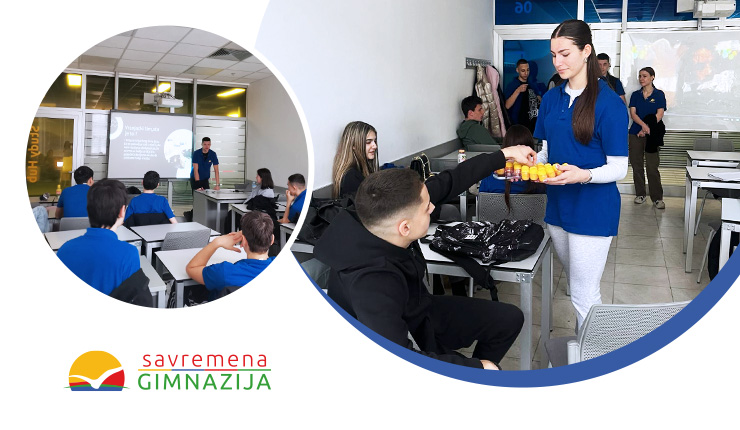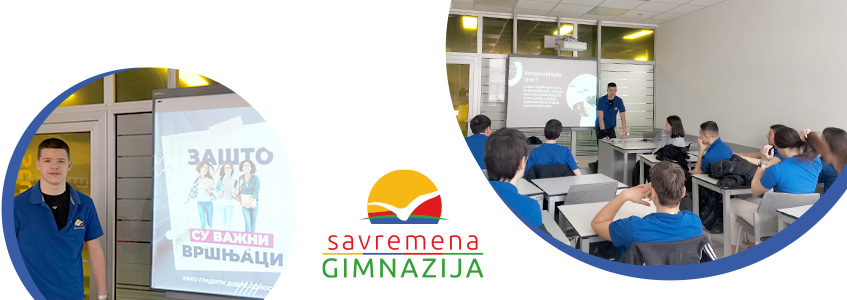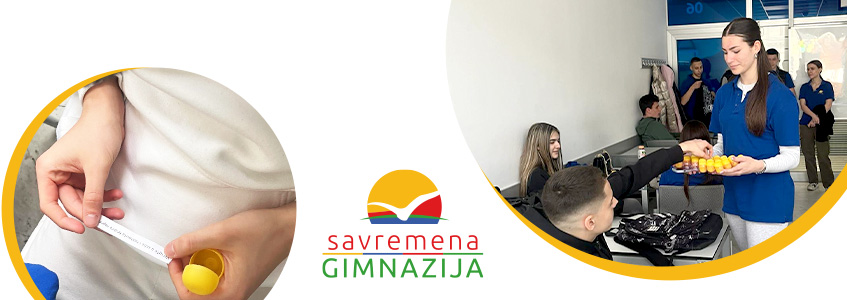
Empathy is highly important in education as it enables us to understand the needs and feelings of others. It helps us become better teachers by allowing us to comprehend what our students are going through, what challenges they face, and how we can help them succeed. Empathy also aids in establishing stronger connections with our students, which can help them feel accepted and better focused on learning.
Empathy in the Classroom: Learning through Words, Body Language, and Active Listening in English
During English language classes, third-grade students engaged in a presentation and guided discussion about empathy, discussing a short film illustrating why empathy is important. They also used brainstorming to select appropriate expressions in English to convey empathy verbally, but there was also discussion about body language as an integral part of communication, as well as ways of actively listening to others.
Fourth-grade students experienced what it means to "put yourself in someone’s shoes" literally, discussing the deeper meaning of this phrase and defining the concept of empathy. Afterward, they analyzed the song "Walk a mile in my shoes" and agreed that the verse:
And before you abuse, criticize and accuse
Just walk a mile in my shoes
is the most powerful and carries an important message for everyone.
They then focused on identifying and naming the emotions someone else might feel in challenging situations, ultimately portraying scenes that occur daily in our lives - both with and without empathy - through acting.
Through laughter and fun, we managed to address important topics, raise some significant questions, and reflect on our own behavior as well as that of others, and how we can all strive to be better.
Sociometric Exercise on Social Inequalities in Elementary School
During classes on social inequalities, students had the opportunity to participate in a sociometric exercise. All students lined up side by side along the length of the classroom, and the teacher asked them specific questions. If the answer was affirmative, they took a step forward. After asking some humorous questions that created a relaxed atmosphere, the students were asked if they personally knew a member of a minority group.
Some said they did, some didn't. Then, the students drew cards featuring certain characters, members of different minorities, and were asked to step into the shoes of the person, a member of the minority they received. Firstly, the teacher reminded them that according to the Universal Declaration of Human Rights, we are all born equal in dignity and rights. The teacher read out certain statements regarding quality of life, privileges, and opportunities, and the task of the students in their roles was to take a step forward if the statement applied to the person they were assigned, or take a step back if it didn’t. At the end of the exercise, all students were unevenly distributed throughout the classroom, some had moved forward, some had not moved, some had gone backward.
The students then shared the roles they had been in and discussed their positions, how those at the back felt, how those in the middle felt, and how those who moved forward felt. After the exercise, students were invited to describe their feelings, experiences, and impressions in one word (e.g., "injustice, sadness, privilege, thoughtfulness, shock..."), followed by a lecture on socially constructed factors of inequality.
Empathy through Art: Using Digital Media to Explore and Present Emotions
In art classes, students used digital creativity to showcase empathy using text and various visual representations. Inspired by discussions with other teachers and drawing from their own experiences, they developed ideas while adhering to aesthetic criteria, considering composition and artistic elements within the work. From the collected material, students will compile a video to be shown at school via TV devices.
Empathy also helps us be more objective and confront our prejudices. When we show empathy towards our students, we demonstrate that we understand them and that everything we do is in their best interest. This can help them share their concerns with us and be more honest, enabling us to provide them with the right assistance.
In summary, empathy is crucial in education as it helps us become better teachers, establish stronger connections with our students, and be more objective in our approach. It is key to creating a positive and encouraging environment in which our students can succeed and develop their full potential.
Empathy in Computer Science and Informatics Classes
In March, as part of the Month of Empathy, computer science and informatics teachers, Nataša Obrenović Filipović and Andrijana Milanović, engaged creative, dedicated, and interested first-year students in creating a photograph related to empathy, either in a general sense or the lack of empathy on the internet.
During the class, they discussed how the lack of empathy on the internet can affect individuals, their moods, and emotions. They emphasized the importance of being aware and mindful of the comments we leave on social media, considering how they might affect others and what potential outcomes they might lead to.
Students were tasked with identifying negative aspects brought about by social media, both within themselves, their surroundings, and among their friends, highlighting the challenges of the 21st century.
Teachers engaged students in a conversation about how individuals are often unaware of the impact of words on the internet and how collectively, we should all strive to be more aware and empathetic.
It's crucial to raise awareness about the causes and consequences of the lack of empathy on social media and encourage each of us to contribute to creating a positive online community.
Discussing and sharing their opinions with us reminded and encouraged us to work on developing empathy and strive for more responsible behavior on the internet and social media.
Peer Team: How Empathy and Collaboration Shape the School Community
As part of the Days of Empathy project, dedicated to the month of March, contemporary freshman Vanja Simić from class I5 presented the Peer Team! He was a guest in the class community of this class, where he presented to the students what this Team represents, what the main benefits of its formation are, and how it can be a driver of changes that students potentially want to create.
Vanja guided students on how they could become part of this Team. Students showed great interest in this topic. They were curious about the difference between the Peer Team and the Student Parliament, how many members the Team could have, and whether Vanja was the coordinator of the Team…
In the second part of the workshop, after Vanja presented his ideas for changes in the school, he handed out slips of paper to the students on which they could write their own ideas. This led to a discussion and debate about the things students consider important.
We commend Vanja Simić for an excellently conducted workshop, an outstanding public presentation, and introducing the Peer Team in a way that is understandable to first-year students. Additionally, we commend class I5 for their active participation and collaboration, which allowed this workshop to be conducted in the best possible manner. We hope that there will be opportunities in the future for this contemporary high school student to hold a workshop in this class again.
Savremena’s Freshmen Inspire and Empower Their Schoolmates
Students from class I5 marked the Days of Empathy at Savremena High School with the Empathy Messages project! Students devised messages intended to motivate, empower, comfort, and support other students. They visited other classes and offered students the chance to draw their "message of the day."
The messages delighted Savremena’s students and brought smiles to their faces! We especially commend Anastasija Radić, Luka Ćosić, Filip Tomašević, Jana Mirjanić, Andrej Ilić, and Danica Damjanović for their effort on this project.
How Empathic Learning is Implemented at Savremena High School
Empathy-based learning is an instructional approach that focuses on understanding the emotions and experiences of others. This approach emphasizes the importance of empathy in the learning process and seeks to create a stimulating and inclusive learning environment where students feel understood and valued.
In an empathy-based learning environment, teachers strive to understand the individual needs, experiences, and perspectives of their students. This enables them to provide support and guidance to students and create lesson plans and activities that are relevant and engaging for their students. Empathy-based learning also involves active listening and valuing students' opinions and experiences, as well as creating a safe and supportive space for open communication and dialogue.
Overall, empathy-based learning is aimed at creating a positive and inclusive learning environment where students have support and are motivated to learn and develop their knowledge. By understanding the emotions and experiences of their students, teachers nurture a sense of connection and belonging, thus providing the support and guidance students need for success.
Savremena High School recognizes the importance of working on this in the times we live in, and that is why we believe that the Days of Empathy in our school should be marked in a special way.
























